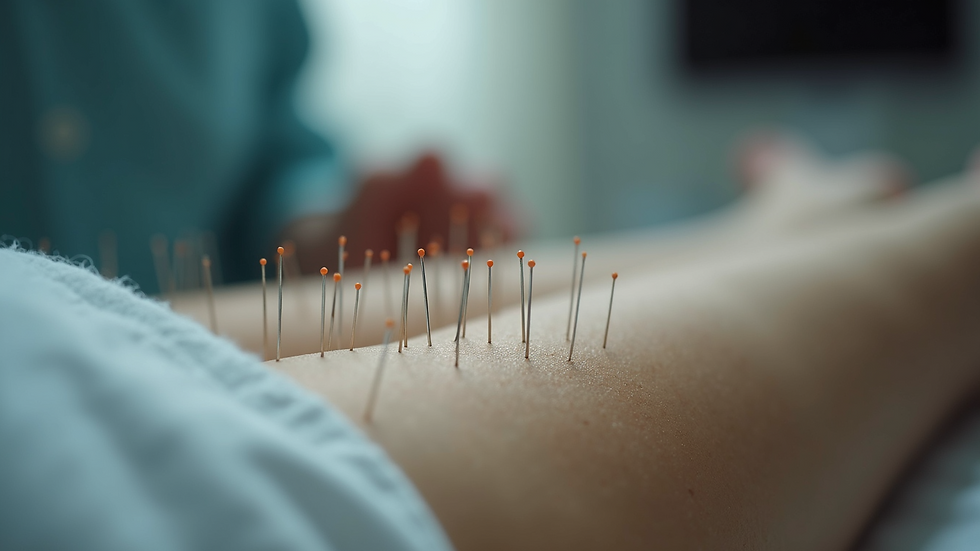How Acupuncture Can Enhance Your Well-Being
- Meghan Miller
- Oct 1
- 4 min read
Acupuncture is an ancient practice that has been used for thousands of years to promote health and balance in the body. It involves inserting thin needles into specific points on the skin to stimulate energy flow and encourage natural healing. Today, acupuncture is gaining popularity worldwide as a complementary therapy for various health conditions and overall wellness. This article explores how acupuncture benefits your well-being, what to expect, and practical tips for incorporating it into your health routine.
Understanding the Acupuncture Benefits for Your Health
Acupuncture works by targeting specific points on the body called acupoints. These points are believed to connect with energy pathways known as meridians. When these pathways are blocked or imbalanced, it can lead to pain, illness, or emotional distress. By stimulating acupoints, acupuncture helps restore the flow of energy, or "Qi," promoting physical and mental harmony.
Some of the most notable acupuncture benefits include:
Pain relief: Acupuncture is widely recognized for reducing chronic pain conditions such as arthritis, migraines, back pain, and fibromyalgia.
Stress reduction: The treatment encourages relaxation and lowers stress hormones, helping to alleviate anxiety and depression.
Improved digestion: Acupuncture can regulate digestive function, easing symptoms like bloating, nausea, and irritable bowel syndrome.
Enhanced immune function: Regular sessions may boost the immune system, making the body more resilient to infections.
Better sleep: Many people report improved sleep quality and reduced insomnia after acupuncture treatments.
These benefits are supported by scientific studies showing acupuncture’s ability to stimulate the nervous system, release endorphins, and improve blood circulation.

How to Maximize Your Acupuncture Benefits
To get the most out of acupuncture, it is important to approach it as part of a holistic wellness plan. Here are some practical recommendations:
Choose a qualified practitioner: Look for licensed acupuncturists with good reviews and proper training. For example, if you are searching for acupuncture fullerton ca, consider visiting this trusted clinic for professional care.
Be consistent: Acupuncture often requires multiple sessions to achieve lasting results. Commit to a treatment schedule recommended by your practitioner.
Communicate openly: Share your symptoms, medical history, and any concerns with your acupuncturist. This helps tailor the treatment to your needs.
Combine with healthy habits: Support acupuncture benefits by maintaining a balanced diet, regular exercise, and stress management techniques like meditation or yoga.
Stay hydrated: Drinking plenty of water before and after sessions helps flush out toxins and supports healing.
By following these steps, you can enhance the effectiveness of acupuncture and enjoy improved well-being.
Is there a downside to acupuncture?
While acupuncture is generally safe, it is important to be aware of potential risks and limitations:
Mild side effects: Some people may experience slight bruising, soreness, or fatigue after treatment. These effects usually resolve quickly.
Not a quick fix: Acupuncture is not an instant cure. It requires patience and multiple sessions to see significant improvements.
Contraindications: Certain conditions, such as bleeding disorders or pregnancy, require special precautions. Always inform your practitioner about your health status.
Variable results: Individual responses to acupuncture vary. Some may experience dramatic relief, while others notice subtle changes.
Cost and accessibility: Depending on location, acupuncture treatments may be costly or not covered by insurance.
Despite these considerations, acupuncture remains a low-risk therapy with many potential benefits when performed by a skilled professional.

What to Expect During an Acupuncture Session
If you are new to acupuncture, knowing what to expect can ease any apprehension. A typical session includes:
Initial consultation: The practitioner will ask about your health history, symptoms, and lifestyle.
Physical examination: They may check your pulse, tongue, and body to assess your condition.
Needle insertion: Thin, sterile needles are gently inserted into specific acupoints. You may feel a slight pinch or tingling sensation.
Relaxation period: Needles remain in place for 15-30 minutes while you rest quietly.
Needle removal: The practitioner removes the needles and may offer advice on self-care.
Most people find acupuncture relaxing and report feeling calm or energized afterward. It is important to wear comfortable clothing and avoid heavy meals before your appointment.
Integrating Acupuncture into Your Wellness Routine
Acupuncture can be a valuable addition to your health regimen. Here are some ways to integrate it effectively:
Use it for preventive care: Regular acupuncture sessions can help maintain balance and prevent illness.
Combine with other therapies: Acupuncture works well alongside physical therapy, chiropractic care, or massage.
Address specific issues: Target chronic pain, stress, or digestive problems with focused acupuncture treatments.
Practice self-care: Follow your practitioner’s recommendations for diet, exercise, and relaxation techniques.
Track your progress: Keep a journal of symptoms and improvements to share with your acupuncturist.
By making acupuncture part of your lifestyle, you can enjoy sustained health benefits and a greater sense of well-being.

Acupuncture offers a natural, holistic approach to enhancing your well-being. Whether you seek relief from pain, stress reduction, or improved overall health, this ancient therapy can be a powerful tool. Remember to choose a qualified practitioner, stay consistent with treatments, and combine acupuncture with healthy habits for the best results. If you are interested in exploring acupuncture fullerton ca, consider reaching out to a reputable clinic to start your journey toward better health today.








Comments